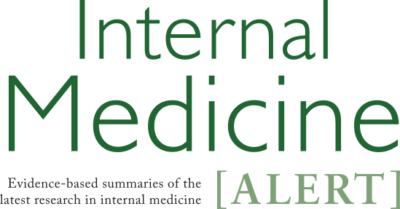
Internal Medicine Alert – February 28, 2004
February 28, 2004
View Issues
-
Morning Headache — Prevalence and Risk Factors
Sleep and headache have a long and complex relationship. Morning (or awakening) headache has been linked to sleep disorders, especially obstructive sleep apnea syndrome, but this association is controversial. -
More Hazards of Air Travel
There is an association between long-distance air flights and venous thromboembolism, but the role of traditional risk factors and prophylactic measures requires more study. -
Cost-Effectiveness of Influenza Treatment
For unvaccinated or high-risk vaccinated patients during the influenza season, empirical oseltamivir treatment is cost-effective. For other patients, rapid diagnostic testing followed by treatment with oseltamivir is cost-effective. Empirical amantadine treatment offers a low-cost alternative if patients cannot afford oseltamivir. -
Do Isolation Precautions for MRSA Compromise Patient Care?
As determined by process-of-care measurement, adverse event occurrence, and patient satisfaction, quality of care is compromised by infection control procedures. -
Long-Term Outcome Comparison of Coronary Angioplasty vs Standard Medical Therapy
It appears safe to conclude that patients with mild-to-moderate angina can be safely managed with continued medical therapy, but percutaneous coronary intervention is certainly indicated and appropriate if anginal symptoms are not controlled by maximum, aggressive medical management. -
Pharmacology Update: Tiotropium Bromide Inhalation Powder (Spiriva)
The FDA has approved the first once-daily, quaternary ammonium, anticholinergic bronchodilator for the treatment of chronic obstructive pulmonary disease. -
Clinical Briefs
Risk of Adenocarcinoma in Barretts Esophagus; Long-Term Effect of Doxazosin, Finasteride, and Combination for BPH; Once Daily Valacyclovir to Reduce Herpes Transmission
